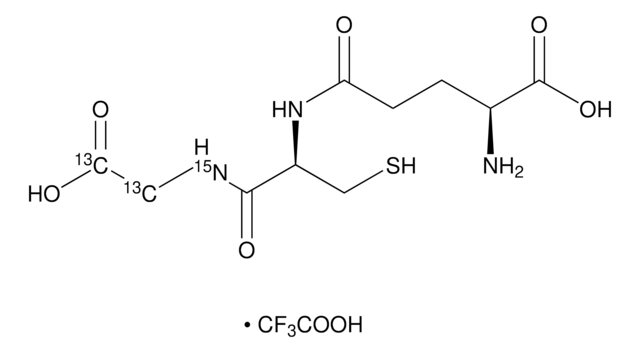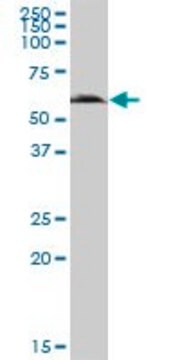G6529
L-Glutathione reduced
≥98.0%, BioXtra
Synonym(s):
γ-L-Glutamyl-L-cysteinyl-glycine, GSH
About This Item
Recommended Products
Product Name
L-Glutathione reduced, BioXtra, ≥98.0%
product line
BioXtra
Quality Level
Assay
≥98.0%
form
powder
impurities
≤0.02% Phosphorus (P)
≤0.1% Insoluble matter
ign. residue
≤0.1%
color
white
mp
192-195 °C (dec.) (lit.)
solubility
H2O: 0.1 M, clear, colorless
anion traces
sulfate (SO42-): ≤0.05%
cation traces
Al: ≤0.0005%
Ca: ≤0.02%
Cu: ≤0.0005%
Fe: ≤0.001%
K: ≤0.005%
Mg: ≤0.001%
NH4+: ≤0.05%
Na: ≤0.005%
Pb: ≤0.001%
Zn: ≤0.0005%
storage temp.
2-8°C
SMILES string
N[C@@H](CCC(=O)N[C@@H](CS)C(=O)NCC(O)=O)C(O)=O
InChI
1S/C10H17N3O6S/c11-5(10(18)19)1-2-7(14)13-6(4-20)9(17)12-3-8(15)16/h5-6,20H,1-4,11H2,(H,12,17)(H,13,14)(H,15,16)(H,18,19)/t5-,6-/m0/s1
InChI key
RWSXRVCMGQZWBV-WDSKDSINSA-N
Looking for similar products? Visit Product Comparison Guide
Amino Acid Sequence
Application
Biochem/physiol Actions
related product
Storage Class Code
11 - Combustible Solids
WGK
WGK 2
Flash Point(F)
Not applicable
Flash Point(C)
Not applicable
Personal Protective Equipment
Choose from one of the most recent versions:
Certificates of Analysis (COA)
Don't see the Right Version?
If you require a particular version, you can look up a specific certificate by the Lot or Batch number.
Already Own This Product?
Find documentation for the products that you have recently purchased in the Document Library.
Customers Also Viewed
Articles
Antioxidants protect biological systems from oxidative damage produced by oxygen-containing free radicals and from redoxactive transition metal ions such as iron, copper, and cadmium.
Our team of scientists has experience in all areas of research including Life Science, Material Science, Chemical Synthesis, Chromatography, Analytical and many others.
Contact Technical Service








